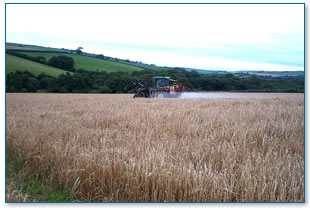pesticides
 |
Cornish River -
De Lank |
Farmers
use pesticides or insecticides to stop crops being damaged and eaten
by 'pests' such as insects or mites. Crops are usually sprayed with
pesticide chemicals using farm machinery.
On organic farms other ways are
found to control pest damage to crops, farmers refuse to use (W11)
chemicals that are harmful to the environment. Farmers might decide
to grow a crop that requires a smaller amount of pesticide. They
might use crop rotation or growing different crops together (inter-cropping)
to reduce (W11) the
need for pesticide application. To learn more about organic farming
visit the Soil
Association’s web site
Some of the sprays that are used
to keep pests away may not be necessary. By not spraying at all,
chemicals are not used, the machinery is not needed and the problem
of disposing of the waste pesticide containers and unused chemicals
is avoided. The farmer therefore saves chemical costs, the costs
of spreading them and the cost of disposing of waste. Solving the
problem at source is the best way.
 |
Pesticide Spraying |
Tanks are used to hold the pesticide
that is sprayed onto the crop using the farm machinery. These tanks
have to be washed out after use and this can cause problems if water
that contains even small amounts of pesticide finds its way directly
into a stream or river where it can cause harm to wildlife.
To reduce (W11)
the amount of pesticides needed specialised machinery could be used
on a farm to keep waste to a minimum. Some brands of pesticide have
a lower chemical strength and with other brands smaller amounts
of pesticide can be used. Farmers might also save money because
they are using less pesticide, which is expensive.
All this helps to stop pesticides
being wasted and ending up in Cornish rivers and thereby entering
the water cycle.
|

